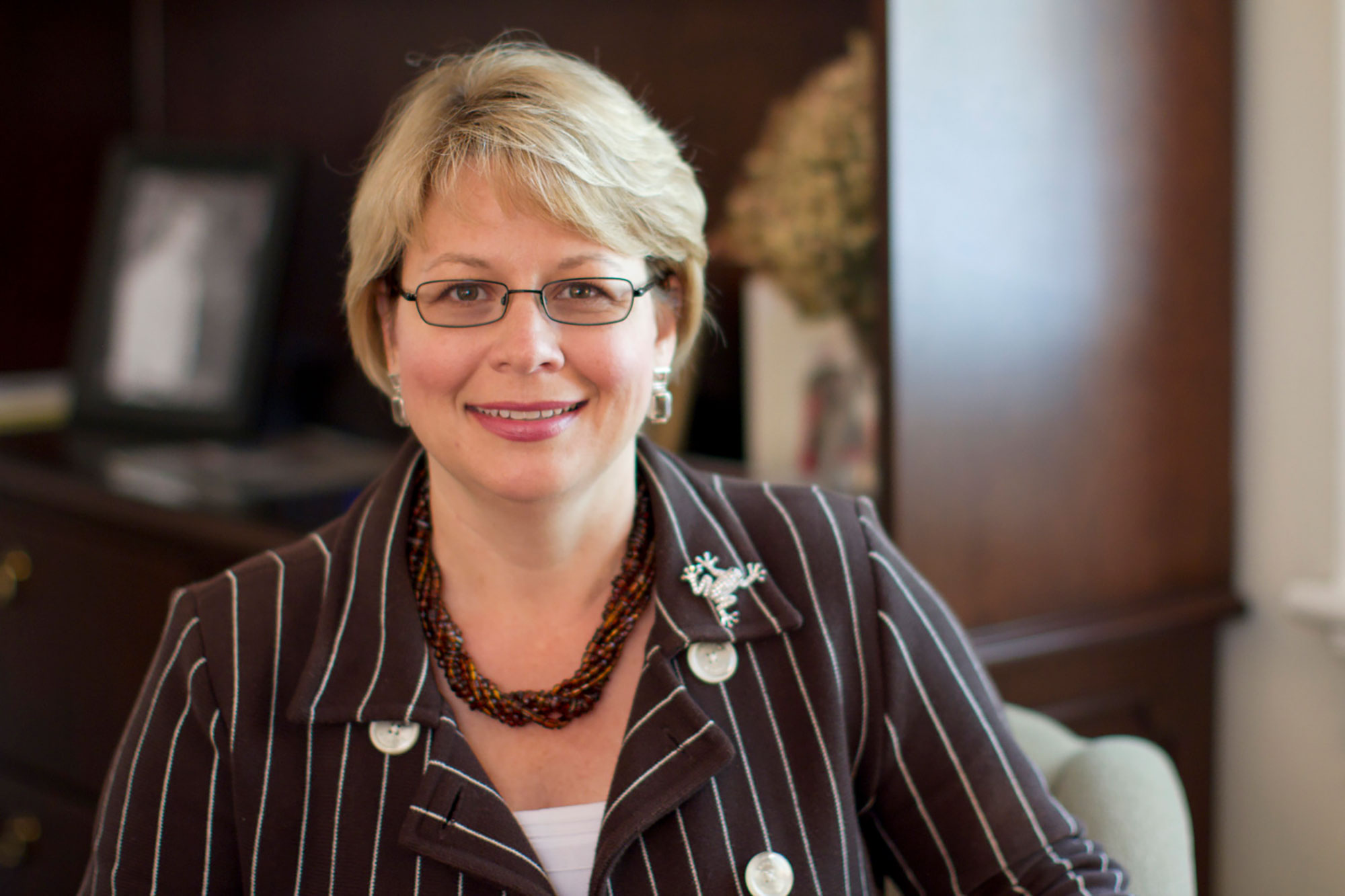
Anda Webb has been working for the University of Virginia since 1987. As vice provost for administration and chief of staff, she oversees an annual total of more than $400 million in budgets for the University’s schools and academic centers. In her prior role as associate dean in the School of Continuing and Professional Studies, Webb was responsible for creating the University’s first part-time degree program for adult students. In 2012 the Women’s Center presented Webb with the Elizabeth Zintl Leadership Award, which is given to a female employee who exhibits a high degree of professionalism, creativity and commitment in their work.
1) Tell us about your greatest triumph or challenge at UVA.
I have had many wonderful things happen to me at UVA, but I think my greatest triumph and greatest challenge are exactly the same: the creation of the Bachelor of Interdisciplinary Studies degree in the School of Continuing and Professional Studies. The BIS degree was the vision of then-dean Sondra Stallard, a great colleague, leader, mentor and friend. This was an opportunity to create a UVA degree for adult students, many who work full time and for whom a UVA degree is a life-long dream. We had a great team in SCPS and a group of committed and dedicated UVA faculty who worked to bring the vision of the BIS to life. I spent time writing policies and developing a business plan, creating enrollment projections and building the curriculum. There are, literally, thousands of details. It was fun and important work, and work that came from my heart. And, when you work with your whole heart, it really doesn’t feel like work.
2) What most excites you about your work at UVA?
The University of Virginia is a special place. I’ve often described it as a “thin place,” which is a spiritual term used to describe a place where the veil between this world and the next is very thin. You can feel the people who have gone before, and have a sense of those who have yet to come. UVA is a place of possibility, one where dreams are made. Even though my work is not always exciting, it is enabling – supporting the work of the University in educating and developing the leaders of tomorrow and giving opportunity to those who may not otherwise have access to a great university education. In my work, my goal is to find ways to say “yes,” finding solutions that enable us to accomplish our goals; sometimes we just need to take another path to get there.
3) Tell us about a defining moment in your work at UVA.
Every time I’ve been given a new opportunity has been a defining moment, as UVA has provided me with a career with enormous possibility. Where else would a young woman – a programmer/analyst hired for her skills in programming in COBOL – be given the opportunity to work in academic administration at the highest levels of a great university? That one opportunity changed the course of my career and my life.
4) Whose work inspires you to work harder or think differently?
I try to read widely and take in varying points of view. Most recently, I have been focused on studying mindfulness, habits, character strengths and somatic intelligence. I’m taking in the work of Doug Silsbee, the Dalai Lama, Chris Peterson and others. I have always been a big reader, and I am spending time learning about accomplished women, whether fiction or nonfiction – Margot Lee Shetterly’s “Hidden Figures” and Dava Sobel’s “The Glass Universe” and “Galileo’s Daughter;” the work of Joan Chittister, such as “The Friendship of Women” and “The Gift of Years;” or Laurie R. King’s “Mary Russell/Sherlock Holmes” mysteries, just for fun.
5) How have mistakes and failures played a role in your career trajectory?
I’m a firm believer that one learns most from mistakes and failures, which is never easy. There are many decisions that I could have – and should have – made differently and, as a result, would have had more positive outcomes. Few things in life that are worthwhile are easy to accomplish, and mistakes and failures are inevitable. Never underestimate the importance of admitting to a mistake, offering a sincere apology when one is warranted, and bouncing back. Hopefully, I’ve learned to admit to my mistakes, learn from them, and move on!
6) How have you been a game changer? How are you making a positive impact on the world?
I think I’ll leave that determination to others! Each day, I try to make a difference. One of the character strengths in Peterson’s work is “zest:” approaching everything you do with excitement and energy. That’s the character strength that I am working on, so that I can say, in the end, that I have “used it up and paid it back,” with interest!
7) What’s something you learned in school/college that turned out to be useful later, in some way you didn’t expect?
As I tell my students, the two most important undergraduate courses of my college career were creative writing and technical writing. Creative writing – the process of opening my mind and just letting the words flow; and technical writing – the process of learning to write succinctly, getting one’s point across crisply and in as few words as possible. Of course, I’ve had to learn to edit my work to get the best of both of those worlds! I think that folks are surprised that creative writing has been so important to my career; after all, I don’t write fiction and I am not a published author. However, creative writing and technical writing have been important as I author reports and documents, learning how to get the message across to those who are not familiar with the subject.
8) Work/life balance: how do you practice that?
I am terrible at work/life balance, so I’m working on it! As I grow older, I spend more time in self-reflection, and I try to leave the work behind when I go home at the end of the day. I took a drawing class in the fall, and spending time sketching is an important mindfulness activity for me. Drawing also helps me to see things differently. Finally, I love to travel and try to take time away – whether it’s a quick trip to the beach or out of the country. Last summer, I spent time in Peru, Ecuador, and the Galapagos. It was the trip of a lifetime, and I was fully disconnected from work!
9) How has your view of yourself as a feminist or your view of feminism changed over time?
As I’ve gotten older, I’ve learned so much. Early in my career I was so arrogant – I thought every accomplishment was due solely to my own hard work. It wasn’t until later that I realized, throughout my entire life, I’ve had great women who supported me along the way, people who truly had faith in me and my abilities. These women were willing to take a chance on me, and I am enormously grateful to them. Thank goodness, the old saying is true: we really do grow wiser as we grow older. As women continue to be marginalized in our society – sometimes in very subtle ways – it is important to recognize it, call it out, and remember that each voice matters. Much work remains, and I am mindful that I am standing on the shoulders of those who have come before.
Webb is also a member of the Advisory Committee for the Virginia Festival of the Book and is on the executive board for the Virginia Network for Women in Higher Education. One of her favorite authors mentioned above, Margot Lee Shetterly, will be presenting at this year’s Virginia Festival of the Book.

